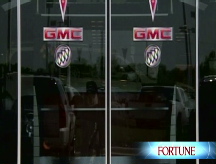Chrysler's management merry-go-round
The automaker churns while GM remains calm - a tale of two companies and the executives who run them.
(Fortune) -- One of the first signs that a company is in trouble is the departure of high-ranking executives. Some get pushed out because they are not doing their job; other hit the street in search of greener pastures.
So when two of Chrysler's top executives exited the company within four days of each other last week, questions immediately arose. Had they been shown the door as part of cost-cutting efforts or stealth reorganization? Or had they merely decided to test the marketplace for their talents?
The departures were noteworthy because Chrysler has been victimized by several high-profile departures in the past several months, in addition to the thousands of other employees who have left via retirement or buyout.
In the most recent instances, there were other factors behind the heightened visibility of the top-level changes. One of the executives, John Campi, senior vice president for parts and service, was a close associate of Chrysler chief executive Bob Nardelli. He'd worked with Nardelli at GE Power Systems in the 1990s and then served as his sourcing and supply chief at Home Depot (HD, Fortune 500).
Campi was appointed to his current job less than a year ago and quickly became, in the words of one trade publication, "one of the most outspoken procurement figures in the world" because of his tough tactics with suppliers that occasionally included lawsuits.
The other executive, Simon Boag, senior vice president for global service and parts, also had been in his latest job for less than a year. A veteran of Ford (F, Fortune 500), GM (GM, Fortune 500), and Mercedes-Benz, he was one of five Chrysler executives who had been awarded retention bonuses in November. In Boag's case, he was due to receive $1.65 million.
In its official statement, Chrysler said that Campi was leaving for health reasons and Boag left "to pursue other interests." In the past, companies have used that kind of oblique language to disguise less seemly departures.
But in Chrysler's case, the language appears to be accurate. According to a well-placed former Chrysler executive, Campi did leave for health reasons, although their exact nature is unknown.
Boag, on the other hand, left because he did not get a promised expansion in responsibility that was promised to him, according to the executive. Apparently, the source says, he also clashed with Campi, which was not a good idea given that Campi is close to Nardelli.
A Chrysler spokesperson said there is no truth to the story. "Simon was part of the restructuring efforts and saw an opportunity to do something different."
In any event, despite its looming collapse, there is no visible brain drain at Chrysler - yet. Executives must be hoping that government aid will be forthcoming before the end of the year to keep the company alive. Or they have decided that, given the dearth of job opportunities in the auto industry, they might as well stay where they are. Detroit is hardly fertile territory for job seekers these days.
The recent upheavals at Chrysler stand in sharp contrast to General Motors, the other sick patient in the Motor City's intensive care ward. To date, there has been no report of retention bonuses paid at GM and no report of executives leaving the company either. Rick Wagoner's team remains intact.
That could be interpreted as a sign of confidence and loyalty on the part of the executives involved or it could just be lethargy and indifference. Most likely, it has to do with corporate culture.
At the top, Chrysler has been a hit-and-run kind of place. Dating back to the 1970s, nearly all its CEOs have come from outside the company: accountant John Riccardo, Ford alum Lee Iacocca, GM's Bob Eaton, Daimler's Dieter Zetsche, Tom LaSorda, another GM'er, and GE's Nardelli.
At GM, on the other hand, it is not unusual for employees to log 40 years or more with the company, and all the CEOs since World War II have been home-grown GM men.
Given that both GM and Chrysler have wound up in the same place - dependent on government aid for survival - one could argue that one approach is not necessarily better than other. ![]()
-
 The retail giant tops the Fortune 500 for the second year in a row. Who else made the list? More
The retail giant tops the Fortune 500 for the second year in a row. Who else made the list? More -
 This group of companies is all about social networking to connect with their customers. More
This group of companies is all about social networking to connect with their customers. More -
 The fight over the cholesterol medication is keeping a generic version from hitting the market. More
The fight over the cholesterol medication is keeping a generic version from hitting the market. More -
 Bin Laden may be dead, but the terrorist group he led doesn't need his money. More
Bin Laden may be dead, but the terrorist group he led doesn't need his money. More -
 U.S. real estate might be a mess, but in other parts of the world, home prices are jumping. More
U.S. real estate might be a mess, but in other parts of the world, home prices are jumping. More -
 Libya's output is a fraction of global production, but it's crucial to the nation's economy. More
Libya's output is a fraction of global production, but it's crucial to the nation's economy. More -
 Once rates start to rise, things could get ugly fast for our neighbors to the north. More
Once rates start to rise, things could get ugly fast for our neighbors to the north. More








